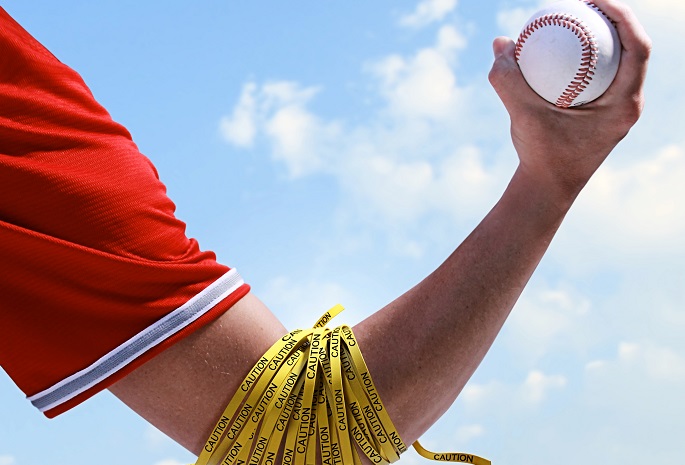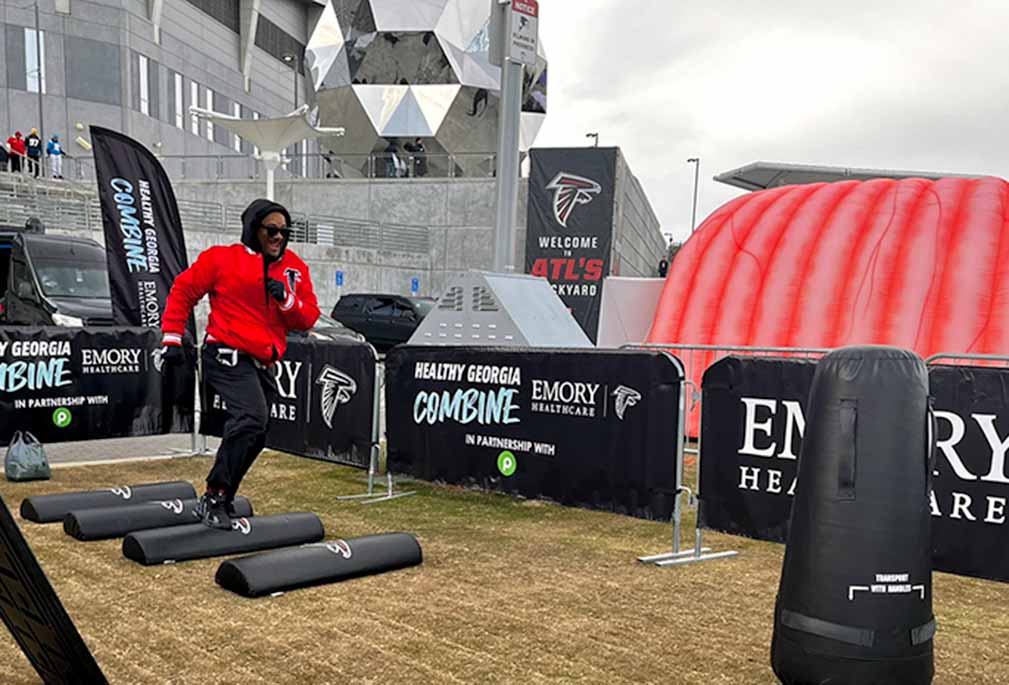Kyle Hammond, MD, grew up playing baseball. He’s been to countless games, whether working as a team doctor for the Atlanta Braves or cheering on his sons’ teams. As a former player and fan, he loves watching his teams win. However, as an orthopaedic surgeon, what he enjoys most is seeing players return to the field safely after an injury.
Some baseball-related injuries are becoming more common, particularly injuries to pitchers. Last year, the share of active Major League Baseball pitchers who had undergone Tommy John surgery hit 35.3%. Surgeons use this procedure to repair or replace the torn ulnar collateral ligament (UCL) inside the elbow.
“My colleagues and I are seeing young teens with structural injuries to their elbows that we used to see more at the high school, college and professional level,” says Dr. Hammond, who sees patients as part of the Emory Sports Medicine Baseball Program. “Shoulder injuries are becoming more common as well. There are several reasons for this, but overuse is usually a factor.”
When Too Much Pitching Is a Problem
Overuse injuries occur when a pitcher throws too many balls in a day or season, doesn’t get enough rest between pitching days, and pitches while fatigued or experiencing arm pain. Younger players (under age 17 or 18) are at increased risk because their bodies are still developing. The repetitive pitching movements stress their bones, joints, muscles and tendons. What may begin as minor discomfort can develop into conditions such as:
- Pitcher’s elbow (bone and/or soft tissue inflammation around the elbow structures)
- Rotator cuff tears or tendinitis (inflammation of the tendons that attach muscle to bone)
- Shoulder labral tears
- Shoulder instability
- UCL tears
Pitch Smart Guidelines Emphasize Injury Prevention
Dr. Hammond encourages athletes to follow Major League Baseball’s “Pitch Smart” Guidelines. These guidelines set pitch count limits and rest recommendations that protect young arms and help prevent future injuries.
Players, parents and coaches must work together to follow the guidelines, which isn’t always easy. “When your kid is having a great day on the mound, it can be disappointing to see them get pulled because of pitch count,” Dr. Hammond says. “But we must create an environment where pitchers put safety first and don’t feel pressure to overuse their arm. Athletes need to know they can come to their parents or coach if they are fatigued or notice symptoms like arm soreness. And that it’s OK to take a break if they need to.”
Other ways to prevent overuse injuries include the following:
- Don’t pitch through pain or fatigue.
- Follow a stretching and strengthening regimen.
- Learn and practice proper pitching mechanics.
- Maintain your overall health with good nutrition, hydration and sleep habits.
- Play multiple sports rather than focusing on baseball year-round.
- Refrain from pitching for at least two to three months of the year, and don’t pitch competitively for at least four months of the year.
- Warm up properly before all practices and games.
Injury prevention begins with having a mindset that doesn’t emphasize pitch velocity, wins and losses. “Young pitchers should be more focused on developing proper mechanics and a love for the game,” Dr. Hammond says. “Middle school and high school is a time to learn how to play the game properly while your body grows and develops.”
Early Treatment Is Essential
Early treatment for an injury can help pitchers get back to throwing as quickly and safely as possible. Pitchers should make an appointment with a specialist if they experience:
- Diminished performance (lower velocity, less ball control, etc.)
- Fatigue in the elbow or shoulder
- Pain from an upper or lower-body injury
Baseball medicine physicians at Emory Sports Medicine offer thorough evaluations and treatment plans for injured players. The baseball medicine team includes four orthopaedic specialists and one orthopaedic surgeon (Dr. Hammond), all of whom are fellowship trained and played baseball when they were younger. They work closely with the program’s athletic trainers and physical therapists, who specialize in preventing and treating injuries in baseball players.
“Our baseball medicine program is the only one of its kind in the region, and we are proud to provide young pitchers with the same baseball-specific services that we offer pitchers with the Atlanta Braves, Georgia Tech and Emory University,” Dr. Hammond says. “Patients can take advantage of our biomechanical and motion analysis equipment and benefit from the rehab programs we developed based on the latest research.”
Dr. Hammond and his colleagues can also refer players to specialized sports performance and pitching coaches in the Atlanta area. These coaches can provide guidance on pitching mechanics and technique.
Treatment for Common Pitching Injuries
Fortunately, most patients do not need surgery for an elbow or shoulder injury. Some of the nonsurgical treatments the program offers include the following:
- Biologic injections, such as platelet-rich plasma injections, to treat UCL injuries
- Physical therapy, which can consist of stretching and strengthening exercises, pain management, manual therapy (such as joint mobilization techniques) and biomechanical analysis
- Shockwave therapy, which uses acoustic shockwaves to promote healing
At the heart of the program is a love for the game and a desire to help baseball players perform at their highest level—safely. “Our team enjoys getting to know players and getting them back on the field as soon as possible,” Dr. Hammond says. “We want them to enjoy playing the sport they love for a long time.”
Go Where the Players Go for Their Care
Visit emoryhealthcare.org/baseball for more information. Whether you have a sports injury, are experiencing knee pain or need a second surgical spine opinion, we’ve got you covered. Schedule your appointment online or call 404-778-3350.
Emory Healthcare is proud to be the official team healthcare provider for the Atlanta Braves.
About Emory Healthcare
At Emory Healthcare, we’re here to help you find the care you need when you need it. As the most trusted health care brand in Georgia, we have more than 3,450 doctors and approximately 500 locations including 11 hospitals, primary care offices and urgent care centers. When you choose Emory Healthcare, you have access to the benefits of an academic health system. By combining clinical care, education and research, our care team works to provide exceptional patient care, using emerging technologies, extensive resources and innovative therapies not available at traditional community hospitals.




